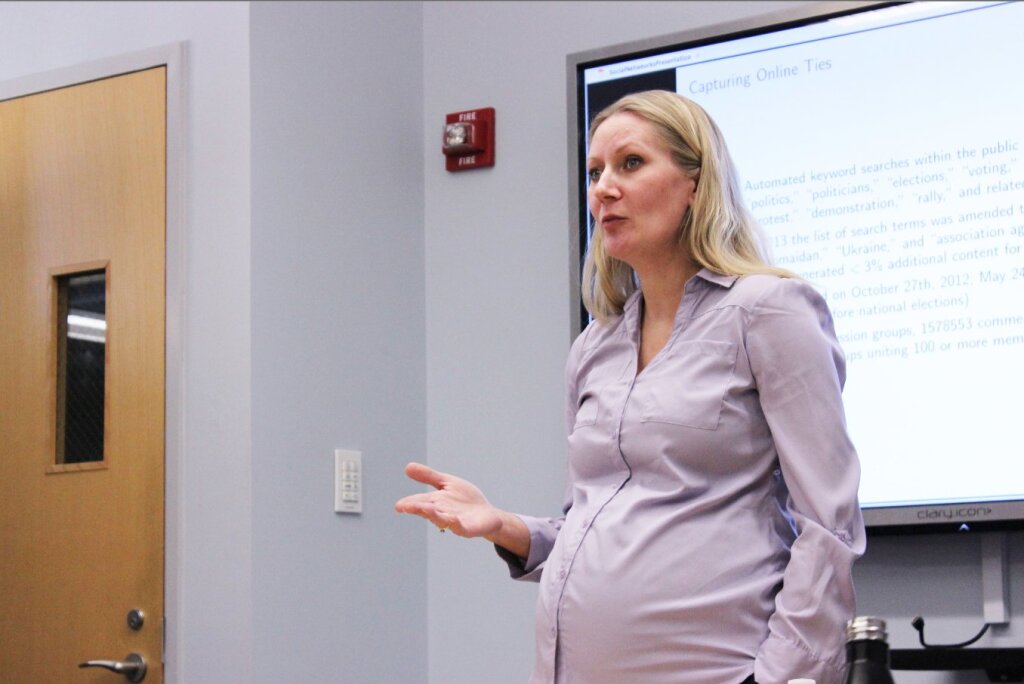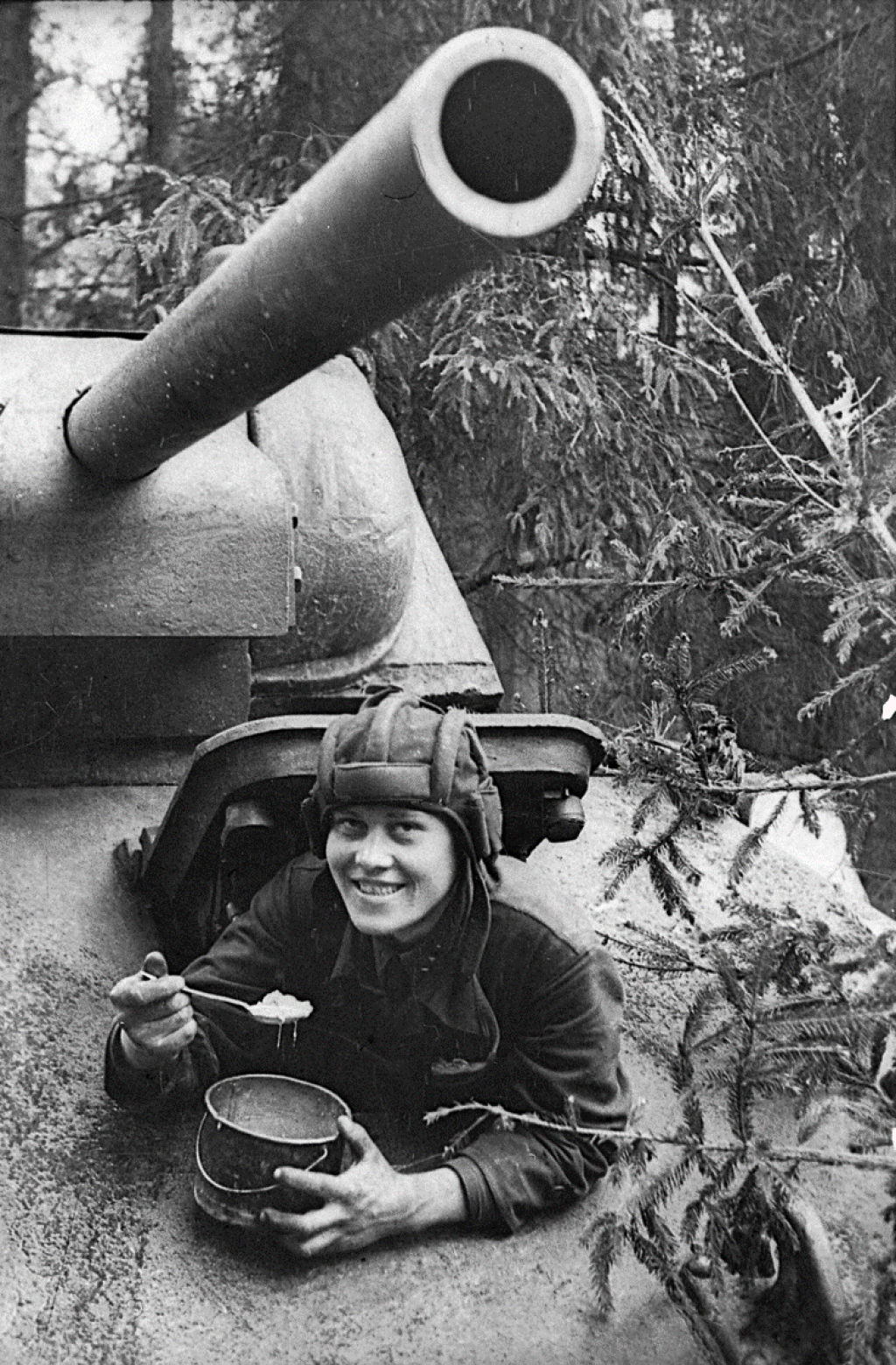Watch the video of the event here
On February 13, 2015, the Jordan Center’s Colloquium Series welcomed Dinissa Duvanova, an Assistant Professor at the Department of International Relations at Lehigh University, to speak about her recent research on online social activism in Ukraine. The colloquium, titled Social Networks as a Barometer of Political Polarization, took on a collegial tone, often turning into a conversation between the presenter and the audience about the project itself as well as general problems concerning online data collection and analysis.
After a brief introduction by Jordan Center Faculty Advisory Board member and NYU Professor of Politics Joshua Tucker, Duvanova outlined the main theoretical objectives of her project. Working with Alexander Semenov (Department of Computer Science and Information Systems, University of Jyväskylä, Finland) and Alexander Nikolaev (Department of Industrial and System Engineering, University at Buffalo, SUNY), Duvanova wants to determine whether online connections unite or divide people and communities. She stated that earlier studies about online social activism brought around a lot of optimism by showing that online networks bridge political divides. Later scholarship, however, was able to prove the opposite as well. What is not clear, Duvanova stated, is whether social media has an independent causal effect on the way in which people behave or not.
“I am not trying to convince you that social media has an independent causal effect; what I want to establish tentatively is that we can analyze social media and study how people get involved in politics,” Duvanova continued. It is known that face-to-face networks have influence on human behavior and interaction. Online networks are generally more complicated. Even those scholars who affirm that a causal effect does exist believe that it remains pretty small. But given how many people are using social media these days, Duvanova added, “even a small causal effect can still affect a large amount of people.”
Duvanova later went on to explain why the team picked Ukraine as their case study. First of all, Ukraine is a developing civil society; it is a “new, unconsolidated democracy with a volatile party system.” Focusing on a developing civil society helps avoid building conclusions that are specific to developed party systems. Second, Ukraine is a country with very pronounced regional particularities (between East and West) – a characteristic that is central to the project’s objectives.
Duvanova’s project focuses on social media platform VKontakte (VK), which has Russian, Ukrainian and English interfaces, and is the largest social network in Ukraine. For the past several years, the team has been searching the publically available communications in VKontakte (i.e. discussion groups, topics on open walls) for specific words that are related to politics, such as “politics, politicians, voting, parties, candidates, demonstration, rally.” In 2013 the team added words “Maidan”, “Euromaidan,” “Ukraine,” and “association agreement.”
The data is gathered and analyzed based on cross-provincial communication. “If online communication and political behavior are related,” she added, “we expect politically-motivated Internet communication to follow regional voting and protest patterns.” For example, in February 2009 discussions between East and West were less frequent than average. During elections, ties formed in the West were more intense than those forming across the divide. The researchers concluded that therefore political polarization can be seen through the analysis of online interaction.
However, Duvanova added, “we also concluded that what was relevant on the divide prior to the Crimean annexation, is no longer.” “We need to find new sets of attributes. Average density of cross provincial communication is going down. They are definitely speaking less across provinces,” she said. For example, Duvanova and her team are thinking of looking at discussions surrounding war casualties and the regions from which they are originating. “Perhaps there are now new attributes that are more relevant than the East/West divide,” Duvanova concluded.
One of the most curious findings in Duvanova’s research was the striking peak in online discussions in Ukraine around the time of the Crimean annexation in February 2014. Duvanova questioned why, if there is so much online communication, people are not talking across provinces. Joshua Tucker and Arturas Rozenas (also a professor in the NYU Politics department) warned that this striking peak might have to do with Internet bots. Tucker also questioned whether this could be the work of people in Russia going on VKontakte to deliberately disrupt the Maidan movement: “There could be a couple of “Nashi” members sitting in a room and deciding they are going to hijack the conversation.” The presenter and participants agreed that for better accuracy and precision of results, it would be important to see how many messages are identical in the pool of data being analyzed. Other issues concerning this type of approach were also highlighted, including the challenges encountered in detecting bots and the possible strategies to identify if an online user is getting paid for posting comments.
Another question raised during the talk was how one can accurately define the origins of the online platform participants. Some participants tend to fake their location in order to avoid problems with the authorities. Identifying at what time certain political groups enter or leave a particular on-line platform also remains challenging. Another problem raised was the difficulty in analyzing the nature of the messages themselves – whether there were positive or negative opinions expressed in the data that was gathered. “If only we could figure out if people agree or disagree – that would be incredibly useful,” Duvanova remarked.
Duvanova concluded the event by stating that it is too early to draw specific conclusions on her research. The electoral sample that the team drew before 2013 showed anticipated results – during the time of election, there is a greater segmentation based on political preference. At the time, electoral behavior and online communication were correlated. But after the peak of the Maidan protests, it seems that what the team had previously known about Ukrainian online communication may no longer apply. “We are trying to develop new patterns. The East/West divide is no longer relevant,” Duvanova added. She added that this shift could possibly be seen in a positive light. “Perhaps we are talking about a new civil society. Perhaps this is how the new Ukrainian nation is being born. I would like to be optimistic in this case,” she said.



